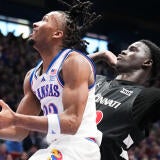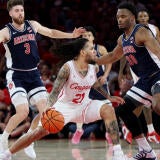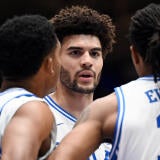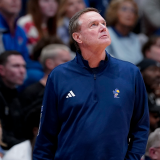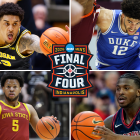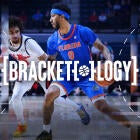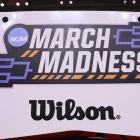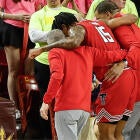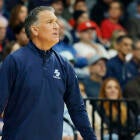Ten programs that have undergone the most unexpected, significant changes since the end of the season
Plenty of teams have experienced the surprising, and it's changed the way next season will play out
We're almost halfway through the offseason, believe it or not.
The 2019 men's national title game was played almost exactly three months ago, on April 8. The opening of the 2019-20 regular season is a little less than four moths from now, on Nov. 5. And in the 92 days that have elapsed, a number of teams have undergone unexpected turnover. With all of the NBA Draft decisions, transfer choices and coaching changes, the auguries for more than a handful of programs have discernibly shifted from what was expected back in the early part of the spring.
Let us examine which schools have been most affected. Plenty of things have happened that will significantly shape the narrative of the forthcoming season. What I did not take into account: coaching changes that happened before the end of the season and the expected graduation/departure of seniors. (And given how Duke and Kentucky always undergo so much change annually, they were exempt from this list.)
Here are 10 programs that have withstood significant revamps -- for good and/or bad -- in the past three months, since the season officially ended. And this is going out before the NCAA's enforcement division sends out Notices of Allegations against two prominent programs later this month -- and four more later this summer.
| 1 | |
There wasn't a coaching change, and no players were lost to early NBA Draft entry, but no program in college basketball got better news this offseason or underwent a more profound makeover than the Huskies. The move from the American Athletic Conference to the Big East won't be official until July 2020, but it's still a game-changer for the program, its lame-duck conference affiliation, its future conference and the fan base. Donations and season-ticket sales have spiked in the two weeks since word leaked that UConn was going to reaffix itself to the Big East brand. Huskies coach Dan Hurley has already said there's been a difference in recruiting. It's a major change, of course, and it also might wind up being the thing that closes the loop on the 2010s decade of realignment, which saw more than a dozen major schools switch conferences. | |
| 2 | |
The Wolverines had more change in significant personnel than any other school listed, starting with the the draft declarations of Charles Matthews, Ignas Brazdeikis and Jordan Poole. The latter two wound up being picked, while Matthews injured his ACL during a pre-draft workout, unfortunately. In early March, it wasn't an outright expectation that all three of those players would leave; even two of the three returning was seen as possible. That downgraded Michigan's outlook on next season, bumping the Wolverines out of any preseason top 10. Then, the biggest blow: John Beilein shocking the basketball world by leaving the college ranks at the age of 66 and taking the Cleveland Cavaliers job. Fortunately for Michigan, the Wolverines hired the most popular person conceivable to replace Beilein: Fab Five alumnus Juwan Howard. It was a good stopgap, even if Beilein's departure meant Michigan missed out on a top-50 player (Jalen Wilson, who is now on his way to Kansas). There's even more. On Saturday, Michigan got a midsummer addition for next season. Franz Wagner, younger brother to former Wolverine Moe Wagner, was officially added to Michigan's roster. The German forward equates to a top-50-level prospect. So much has changed in so little time for UM. | |
| 3 | |
The stunner transfer decision of the offseason was in fact a joint one that happened in early April when Sam and Joey Hauser announced they were leaving Marquette. This came all but a few days after we learned that likely preseason All-American Markus Howard would return for his senior season. (Hmmmm.) Had the brothers returned, Marquette would have been a surefire top-20 preseason team. Instead, Marquette lost two of its four best players for next season. (Joey Hauser transferred to Michigan State; Sam to Virginia.) The Golden Eagles did land Jayce Johnson, a center from Utah who is a grad transfer and will play next season. Those weren't the only changes. Coaches almost never have to think about losing a top assistant in the summer to a head-coaching opportunity. But that's what happened at Marquette last week when Golden Eagles assistant Brett Nelson was named the coach at Holy Cross. It's a great opportunity for Nelson, who's been scratching for his chance. It also tosses a wrench into the recruiting process for Marquette, as it loses a valuable assistant on the precipice of the all-important July recruiting period. | |
| 4 | |
I'm not even counting the departure of Buzz Williams here. Firstly, Williams' exodus from the Hokies -- to Texas A&M -- was rumored for months before it became official. (Williams was replaced by Mike Young, formerly of Wofford, who seems like a good fit for that school.) For VT, the problem is the outgoing talent. Chris Clarke (who was suspended all of last season) grad-transferred to Texas Tech. Kerry Blackshear Jr. vacillated between going pro, staying with the Hokies or transferring elsewhere in a final year of college. Blackshear was regarded as a top-three transfer candidate this offseason; his ultimate choice of Florida, which came last week, vaulted the Gators' outlook for 2019-20. And, though unavoidable, the draft decision of Nickeil Alexander-Walker was a doozy for a program not accustomed to having top-20 picks on the roster. Young was able to bring one talented Wofford player with him up to Blacksburg, Virginia: Keve Aluma, a power forward who will be a redshirt junior come 2020-21, could be a solid rotation player with a year of seasoning behind the scenes. But it's almost certainly going to be a big step-back season for the Hokies after what was their greatest three-year run in school history. | |
| 5 | |
The Bruins qualify here, as Mick Cronin was hired at UCLA after the season ended; he agreed to become UCLA's coach the morning after the national title game. This is a top-five all-time program, so a change in coach is significant, and it's worth reminding you that it took UCLA more than three months to hire someone to replace Steve Alford, which was embarrassing for the school. Outside of the drastic coaching change, the Bruins also lost Kris Wilkes, Jaylen Hands and Moses Brown to early NBA Draft entry. Credit to Hands, as he was the most shocking draft pick, in my most humble opinion. (He went 56th to the Nets.) The Bruins will be markedly different next season vs. last, and what's interesting about that is it will be true despite the fact UCLA didn't lose or gain any transfer of note. That's rare in today's college culture. | |
| 6 | |
ISU took in a pair of sit-out transfers (Troy's Javan Johnson and Penn State's Rasir Bolton), but that's not why Clones are on this list. Steve Prohm lost Lindell Wigginton, Cameron Lard and Talen Horton-Tucker, the last of whom went 46th in the NBA Draft. (Outgoing grad student Marial Shayok was also a second-round pick.) Horton-Tucker got picked because of his insane length and undeniable basketball savvy. It's a blow for ISU; had Horton-Tucker returned, the Cyclones would have been viable to compete for the Big 12 title and he would've been one of the 15-20 best players in college basketball. As is, ISU does get Tyrese Haliburton back for his sophomore season. It will come with great expectations: Haliburton was a star for the gold-medal-winning USA U19 team that just won the World Cup over the weekend. He seems set to be one of the five best point guards in the sport. From a talent perspective, ISU lost a lot. Prohm is sure to overcome any lapses there, though. He's won 21 or more games in seven out of eight seasons as a head coach. | |
| 7 | |
Mark Few has operated the transfer wire as well as almost any coach in the past decade. Brandon Clarke turned into a first-round 2019 pick after leaving San Jose State to transform his game at Gonzaga. So while Gonzaga lost Clarke, Rui Hachimura and (somewhat unexpectedly) the undrafted Zach Norvell Jr., the Zags gained two grad transfers who will be huge next season. The first is Texas A&M's Admon Gilder, a 3-and-D shooting guard who might step in and average 14 points. Gonzaga's other transfer is North Texas point guard Ryan Woolridge, who plays the point but is going to bring a speed element to next year's team that the 2018-19 squad didn't have. The Zags have eased into a position that was unthinkable a decade ago: they're a power program not in a power league, and a outfit that can just as easily produce lottery picks, upgrade with transfers, maintain coaching stability -- and still keep older, talented players around. On that note, Killian Tillie opted to return next season, which is huge for Gonzaga's chances at being a top-10 team. | |
| 8 | |
This is the one team pick where it's mostly about the coaching change. For St. John's, it was a necessary switch. The Red Storm lost Chris Mullin after the season ended -- and this happened after St. John's AD Mike Cragg sent out a statement at the Final Four that no changes were coming with Mullin. It was a weird deal, especially since things got noisy in late March that Mullin was going to be out. When he finally left, there was a coaching search that played out publicly -- and included multiple coaches turning down St. John's -- before Mike Anderson was hired on April 19. He might not have fully cleaned out his home in Arkansas by that point. The Anderson hire was questioned within the industry, but perhaps Cragg pulled off something better than anyone is expecting. Player-wise, the early departure of Shamorie Ponds was expected. Ponds going undrafted, however, was not. | |
| 9 | |
The moment Virginia won the national title over Texas Tech, things changed forever for the program and its coach, Tony Bennett. From a pure coaching perspective, Bennett has a case as the game's best right now. I mean, Virginia bounced back from losing to No. 16 seed UMBC ... by winning the whole freaking thing one year later. That's an all-time story. That six-game win streak also induced a facelift for the 2019-20 season. Kyle Guy, Ty Jerome and De'Andre Hunter all left early for the draft. Guy leaving wasn't anticipated, and had Virginia flamed out early in the Big Dance, it's conceivable Jerome would've returned. (Good for him that didn't happen: Jerome landed in Phoenix in the first round and figures to be a solid pro going forward.) Things got a little more anxious than expected when Elite Eight hero Mamadi Diakite waited until the final hours before deciding to withdraw his name from the early entrant pool and return to UVA. That will be big. Also big, but on a delay: The Cavaliers brought in Sam Hauser, but he'll sit next season before stepping in for 2020-21. | |
| 10 | |
It's only fitting to end this list with the Bayou Bengals. LSU played out the final few weeks of its season without Will Wade as its acting coach. It got Wade back on April 14 (after he eventually agreed to meet with school administrators), and shortly thereafter then-athletic director Joe Alleva announced he'd be leaving his post. The school and Wade also endured some bad press when the April trial looped in Wade once more -- and not in a flattering portrait. Then there was the odd press conference Wade had in May at the SEC's spring meetings, when he faced reporters and half-answered questions. Just a few non-denial denials there, no biggie. But Wade is back, has appeased his bosses and LSU's noisy start to the offseason only amplified a lot of the questions surrounding Wade and just exactly what did or did not happen with him. Roster-wise, LSU lost Tremont Waters and Naz Reid to the NBA Draft. It retained Javonte Smart (he of the infamous "strong-ass offer") and signed five-star Trendon Watford, who is on campus and ready to contribute this forthcoming season. Trite as it may be, it fits for LSU: the more things change, the more they stay the same. | |












